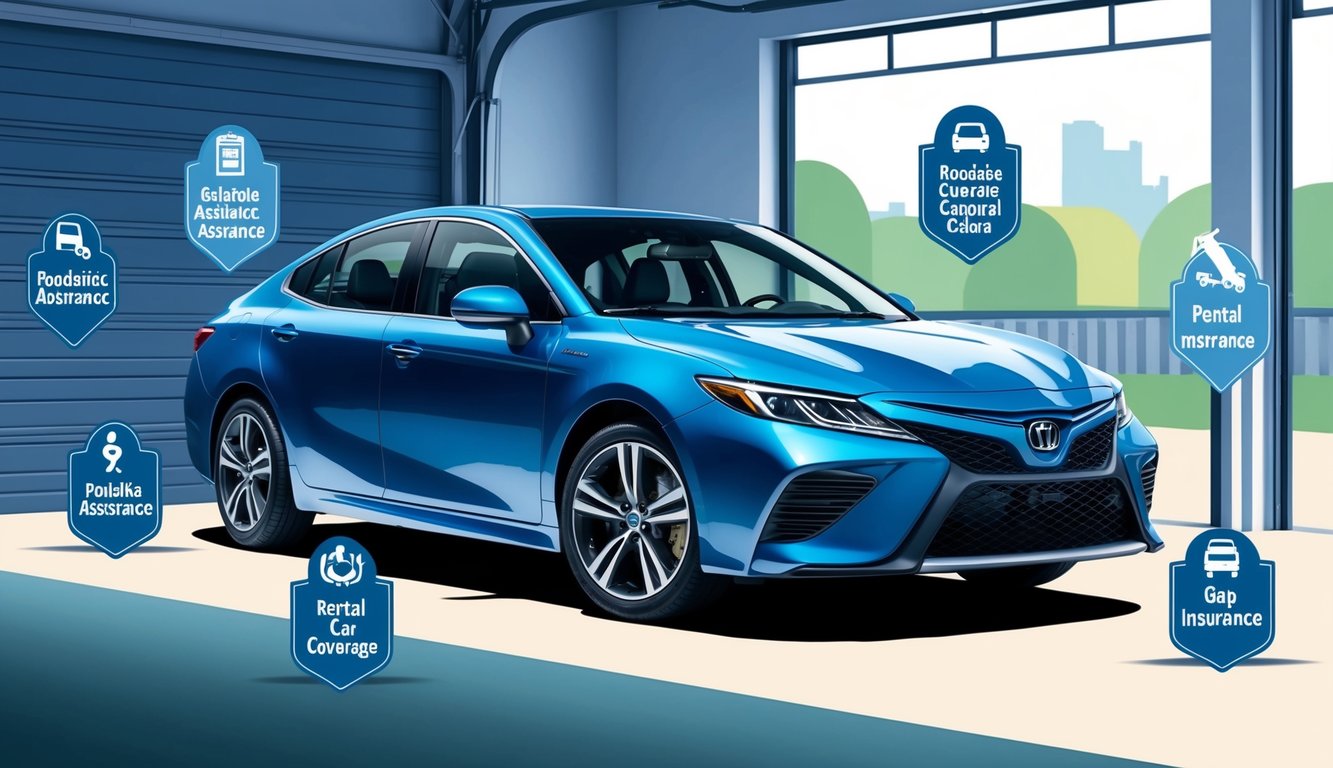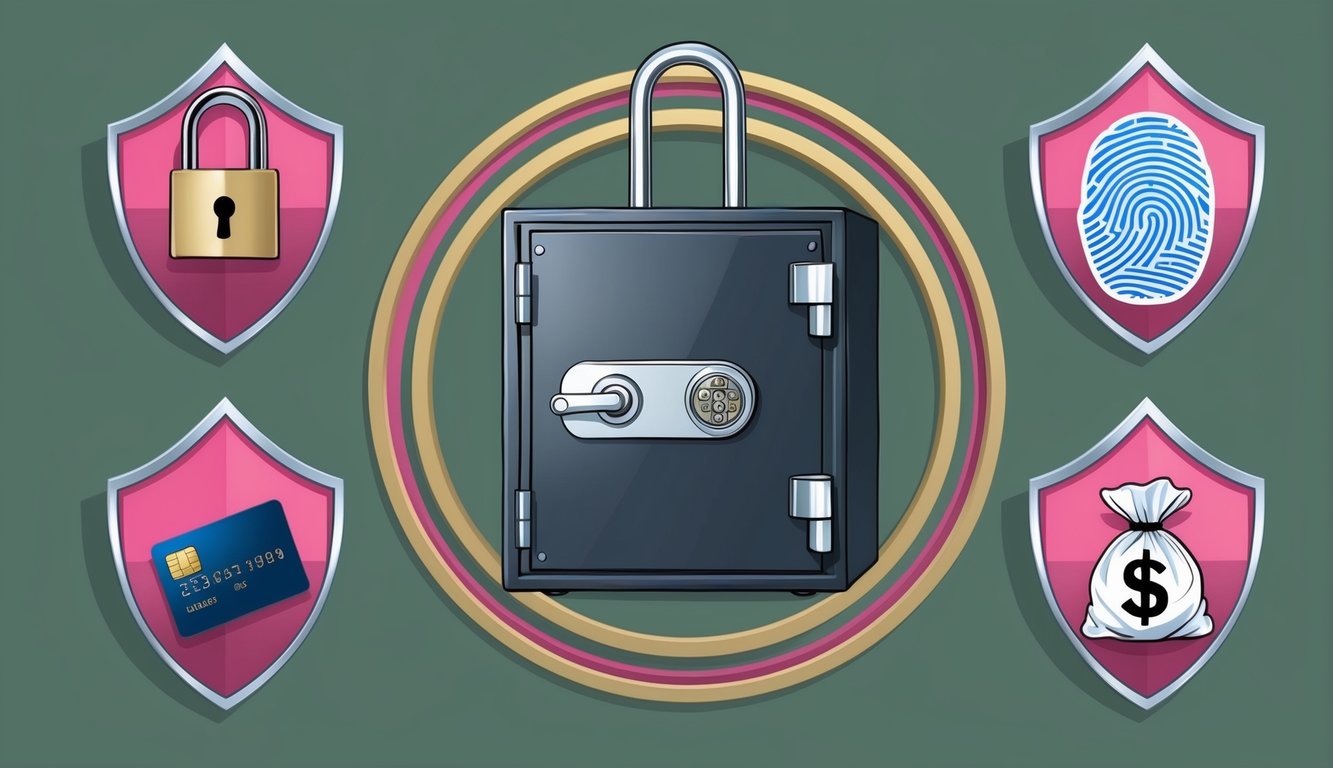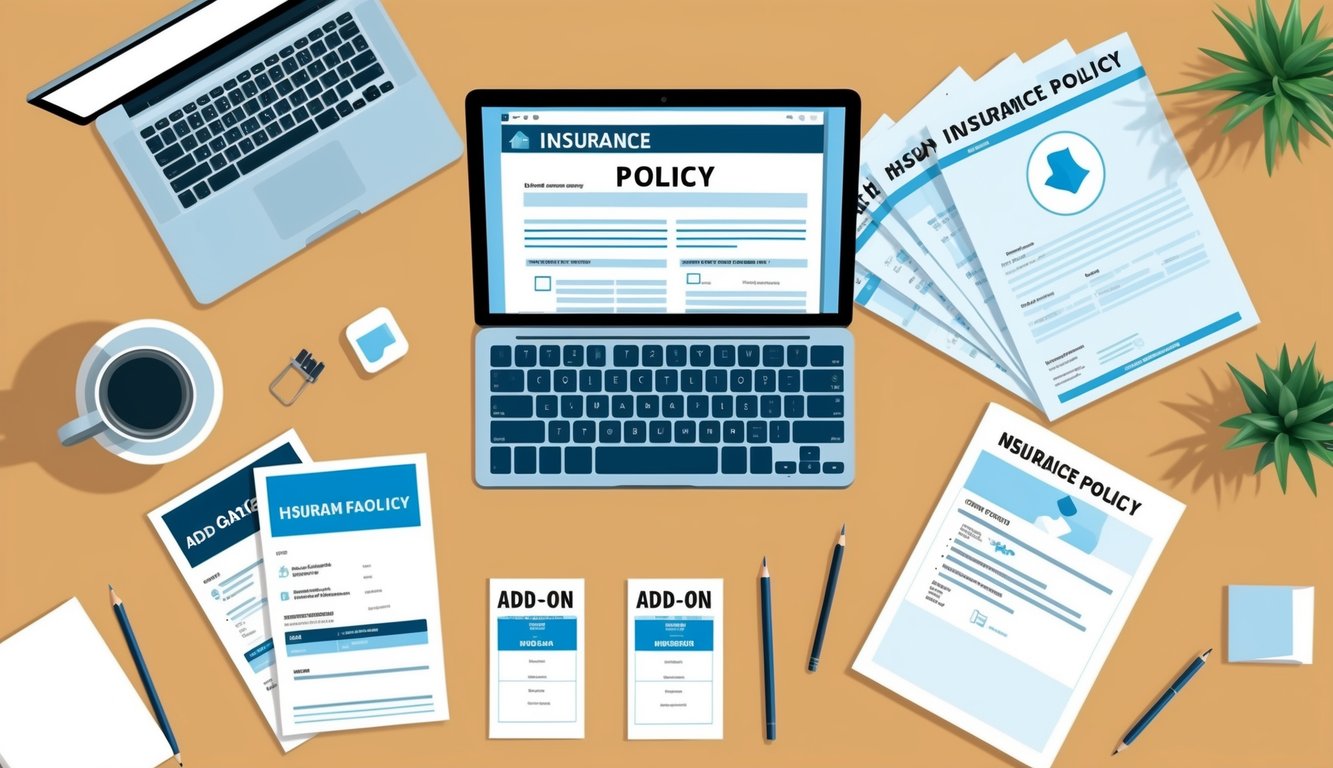Car insurance policies offer more than just basic coverage.
Many drivers are unaware of the valuable add-ons available to enhance their protection on the road.
These extras can provide peace of mind and financial security in various scenarios.
Customizing your car insurance with the right add-ons can save you money and stress in the long run. From roadside assistance to accident forgiveness, there are numerous options to consider.
Understanding these additional coverages can help you make informed decisions about your auto insurance policy.
1) Rental Car Reimbursement
Rental car reimbursement is an often-overlooked insurance add-on that can save you money and hassle.
This coverage pays for a rental vehicle while your car is being repaired due to a covered accident or breakdown.
Without this coverage, you might find yourself paying out of pocket for transportation during repairs. Rental reimbursement typically covers up to $30-$60 per day, depending on your policy limits.
You may think you don’t need this coverage if you have a second vehicle or can rely on public transportation.
However, unexpected situations can arise, making a rental car necessary for work or family obligations.
The cost of this add-on is usually minimal compared to the potential expense of renting a car out of pocket. Some policies cover up to 30 days of rental fees, which can add up to significant savings.
It’s important to note that rental reimbursement is different from the coverage you might purchase when renting a car for travel. This add-on specifically applies to situations where your insured vehicle is being repaired.
When considering this coverage, evaluate your personal situation.
If you rely heavily on your vehicle for daily activities, rental reimbursement can provide peace of mind and financial protection.
Remember to check the daily and per-incident limits of your policy.
You can often adjust these limits to better suit your needs and budget.
2) Pet Injury Coverage
You might not realize it, but your furry friend could benefit from pet injury coverage.
This add-on protects your pet if they’re injured while riding in your car during an accident.
Many standard auto insurance policies don’t include this protection.
Adding pet injury coverage can help cover veterinary bills if your dog or cat gets hurt in a collision.
Erie Insurance offers pet injury coverage as part of their standard auto policies.
They pay up to $500 per pet if your animal is injured in a car accident.
Some insurers allow you to add this coverage separately.
It’s often affordable and can provide peace of mind when traveling with your pets.
Pet injury coverage typically applies to cats and dogs.
It may cover treatments like surgeries, medications, and follow-up care related to accident injuries.
Remember, this is different from general pet insurance.
Pet injury coverage specifically relates to auto accidents, while pet insurance covers a broader range of health issues.
Consider adding this coverage if you frequently travel with your pets.
It can help offset unexpected vet bills and ensure your furry companions receive prompt care after an accident.
3) Gap Insurance
Gap insurance is a crucial add-on that protects you financially if your car is totaled or stolen.
It covers the difference between what you owe on your auto loan and the actual cash value of your vehicle.
When you drive a new car off the lot, it immediately depreciates in value.
This rapid depreciation can leave you owing more on your loan than your car is worth.
If your car is totaled or stolen, your standard auto insurance typically only covers the current market value of your vehicle.
This can leave you with a significant financial shortfall.
Gap insurance steps in to cover this difference, ensuring you’re not left paying for a car you no longer have.
It’s especially valuable if you’ve made a small down payment or have a long-term auto loan.
You can purchase gap insurance from your auto insurer, often for a modest annual fee.
Some lenders and dealerships also offer this coverage, though it may be more expensive through these channels.
Consider gap insurance if you’ve financed a new car, leased a vehicle, or bought a used car that depreciates quickly.
It provides peace of mind and financial protection during the early years of your auto loan or lease.
Remember, gap insurance is temporary.
Once you owe less on your car than its actual cash value, you can drop this coverage.
4) New Car Replacement

New car replacement insurance is an add-on that can provide valuable protection for your new vehicle.
This coverage goes beyond standard auto insurance by offering to replace your totaled car with a brand new one of the same make and model.
If you’ve recently purchased a new car, you might want to consider this option.
It addresses the issue of rapid depreciation that occurs as soon as you drive your new car off the lot.
With standard insurance, you’d typically receive the actual cash value of your car if it’s totaled.
This amount is often significantly less than what you paid for the vehicle. New car replacement insurance bridges this gap, ensuring you can get a new car without financial strain.
Most insurers offer this coverage for cars that are one to two years old.
The cost varies but usually adds about 5% to 13% to your comprehensive and collision premiums.
Keep in mind that eligibility criteria may apply.
These often include restrictions on the vehicle’s age, mileage, and whether it’s owned or financed.
Some insurers may also require you to be the original owner of the car.
While this coverage can be beneficial, it’s important to weigh the cost against the potential benefits.
If you plan to keep your new car for many years, the value of this coverage diminishes over time as your car depreciates.
5) Roadside Assistance
Roadside assistance is an invaluable insurance add-on that can save you from stressful situations on the road.
This service provides help when your vehicle breaks down, runs out of fuel, or experiences other issues while you’re traveling.
Most roadside assistance plans cover essential services like towing, jump-starts, flat tire changes, and lockout assistance.
Some providers even offer coverage for bicycles in addition to cars, expanding the protection for different modes of transportation.
When choosing a roadside assistance plan, consider the coverage limits and frequency of service calls allowed.
Some plans offer unlimited service calls, while others may have restrictions.
Trip interruption benefits are another feature to look for in a comprehensive roadside assistance package.
These can help cover expenses if your vehicle breaks down far from home, potentially saving you significant out-of-pocket costs.
Pricing for roadside assistance plans varies widely.
Basic plans can start as low as 89 per year, while more comprehensive coverage may cost up to $240 annually, depending on the type of vehicle and level of service.
You can often add roadside assistance to your existing auto insurance policy.
Alternatively, you might consider standalone plans from specialized providers or auto clubs.
Compare options to find the best fit for your needs and budget.
6) Rideshare Insurance

If you drive for companies like Uber, Lyft, or DoorDash, you need rideshare insurance.
This coverage fills the gaps between your personal auto policy and the insurance provided by the rideshare company.
Your personal auto insurance typically doesn’t cover you when you’re using your vehicle for commercial purposes.
Rideshare companies offer some coverage, but it may not be enough to fully protect you.
Rideshare insurance extends your personal policy to cover you during all stages of rideshare driving.
This includes when you’re waiting for a ride request, en route to pick up a passenger, and while transporting passengers.
Several major insurers offer rideshare coverage. Progressive provides a rideshare endorsement in 40 states, while American Family allows drivers to extend their existing personal policy to cover the initial phase of rideshare driving.
The cost of rideshare insurance varies depending on factors like your location, driving record, and the type of coverage you choose.
It’s often more affordable than you might expect, especially considering the protection it provides.
Without proper coverage, you could be financially responsible for damages or injuries that occur while you’re driving for a rideshare company.
This risk makes rideshare insurance a crucial add-on for anyone involved in the gig economy.
7) Identity Theft Protection

Identity theft can have devastating consequences on your financial health and personal life.
With cybercrime on the rise, protecting your identity has become more crucial than ever.
Identity theft protection services offer a comprehensive shield against fraudsters.
These services typically include credit monitoring at all three major credit bureaus.
They will alert you to any suspicious activity.
Many providers also offer dark web monitoring, scanning the internet’s hidden corners for your personal information.
This can help you catch potential breaches early.
Some services provide up to $5 million in identity theft insurance.
This coverage can be invaluable if you fall victim to identity theft, helping cover legal fees and lost wages.
Advanced protection services may use artificial intelligence to combat the latest fraud techniques.
This cutting-edge technology can provide an extra layer of security against evolving threats.
When choosing a provider, consider the range of features offered.
Look for services that provide real-time fraud alerts, allowing you to act quickly if your identity is compromised.
While identity theft protection can’t prevent all fraud, it can significantly reduce your risk and provide support if you become a victim.
Consider adding this valuable protection to your insurance portfolio.
Understanding Insurance Add-Ons

Insurance add-ons provide extra protection beyond standard policies.
They allow you to tailor coverage to your specific needs and circumstances.
The Basics of Insurance Add-Ons
Insurance add-ons, also known as endorsements or riders, are optional coverages you can attach to your main policy.
They enhance your protection for specific situations or items.
Add-ons come at an additional cost but can be worth the investment for the right circumstances.
They’re available for various types of insurance, including auto, home, and life policies.
Common examples include:
- Roadside assistance for auto insurance
- Equipment breakdown coverage for home insurance
- Critical illness riders for life insurance
When considering add-ons, evaluate your personal needs and risk factors.
Some may be essential for your situation, while others might be unnecessary.
How Add-Ons Enhance Your Policy
Add-ons fill gaps in standard policies, providing you with more comprehensive protection.
They can cover scenarios or items that basic policies exclude or limit.
For instance, equipment breakdown coverage can protect your home’s appliances and electronics beyond normal wear and tear.
This add-on typically costs around $3 per month for homeowners insurance.
In auto insurance, a diminishing deductible can lower your out-of-pocket costs over time.
Your deductible may decrease by $100 each year you remain accident-free.
Add-ons can also provide peace of mind in specific situations.
For example, rental car coverage ensures you’re protected when driving a temporary vehicle.
Before purchasing add-ons, compare the cost to potential benefits.
Some may save you money in the long run, while others might not be cost-effective for your situation.
Benefits of Lesser-Known Insurance Add-Ons

Lesser-known insurance add-ons offer valuable financial protection and allow you to customize your coverage.
These options can provide peace of mind and safeguard against unexpected expenses.
Financial Protection and Coverage
Equipment breakdown coverage protects your home’s electronics and appliances.
This add-on can save you money on repair or replacement costs for items like your HVAC system, refrigerator, or computer.
Electronic device coverage for your car insurance reimburses you if your laptop or smartphone is damaged or stolen while in your vehicle.
This protection extends beyond standard auto insurance policies.
Pet insurance helps offset veterinary expenses.
It may cover exams, prescriptions, lab tests, surgeries, and emergency visits.
You pay upfront and get reimbursed based on your policy’s deductible and limits.
Customizing Your Insurance Plan
Guaranteed replacement cost coverage ensures your home is fully rebuilt, even if costs exceed your policy limits.
This add-on protects you from unexpected increases in construction expenses.
You can tailor your insurance to fit your specific needs.
Add-ons allow you to increase coverage for valuable items like jewelry or art.
You can also opt for additional liability protection or coverage for home-based businesses.
By choosing the right add-ons, you create a comprehensive insurance plan that addresses your unique risks and concerns.
This customization helps you avoid coverage gaps and provides greater financial security.
Evaluating the Need for Additional Insurance

Determining if you need extra insurance coverage requires careful consideration of your unique circumstances and potential risks.
A thorough assessment can help you make informed decisions about which add-ons are truly necessary for your situation.
Personalized Risk Assessment
Start by examining your lifestyle, assets, and potential vulnerabilities.
Consider factors like your location, occupation, and hobbies.
Do you live in an area prone to natural disasters? Are you self-employed or work in a high-risk profession? These elements can influence your insurance needs.
Review your existing coverage to identify any gaps.
Look at your current policy limits and exclusions.
Are there specific risks you’re concerned about that aren’t adequately covered?
Make a list of valuable possessions and calculate their total worth.
This can help you determine if you need additional coverage for items like jewelry, art, or electronics.
Consider your financial situation.
Could you afford to pay out-of-pocket for major repairs or replacements if something unexpected happened?
Consulting with an Insurance Expert
Car insurance add-ons can be complex, so seek professional advice.
An experienced insurance agent can provide valuable insights tailored to your needs.
Prepare a list of questions and concerns before meeting with an expert.
This ensures you cover all important topics during your consultation.
Be honest about your lifestyle and assets.
The more information you provide, the better equipped the expert will be to recommend appropriate coverage.
Ask about the costs and benefits of different add-ons.
Understanding the value proposition of each option can help you make more informed decisions.
Don’t be afraid to get multiple opinions.
Different insurance providers may offer varying perspectives and options to consider.






